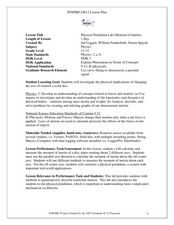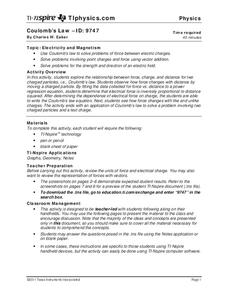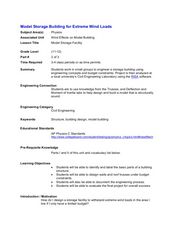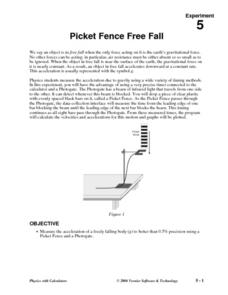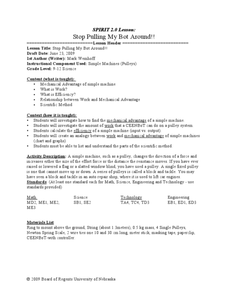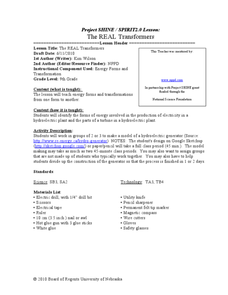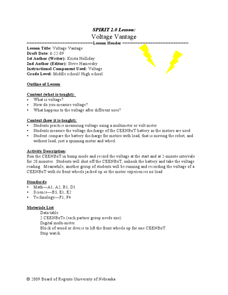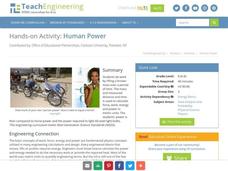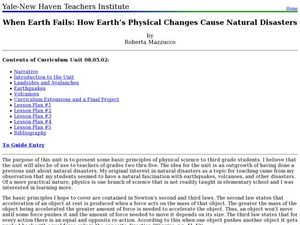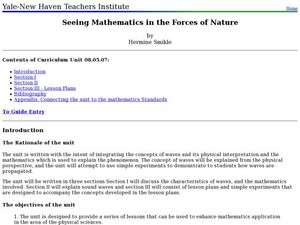Curated OER
Pop Rocket - Trash to Treasure
First off, Newton's laws of motion aren't often taught at 2nd grade, so this lesson may be more appropriate for upper elementary learners. It begins with a discussion and demonstration of the laws of motion, and then has individuals...
Curated OER
Physical Pendulum Lab
Students calculate the moment of inertia of a disc. In this physics lesson, students differentiate the two methods used in finding the inertia. They construct their own pendulum for the lab.
Curated OER
Physics Rewind
Eighth graders differentiate speed and velocity. In this physics instructional activity, 8th graders explain Newton's laws of motion. They calculate speed using a mathematical formula.
Curated OER
Force Counterforce
Students hypothesize what forces affect the motion of a falling body. In this physical science lesson, students create diagrams and illustrations to support their hypothesis. They perform the experiment and record observations.
Curated OER
Rocket Physics
Young scholars investigate the relationship between impulse, momentum, kinetic and potential energy and aerodynamic drag. In this physics lesson, students calculate data taken from launching a rocket. They compare the theoretical...
Curated OER
What's the Rub? It's All About Friction!
Students determine the coefficient of friction for different surfaces. In this physics lesson plan, students identify the factors that affect friction. They collect data and write a formal lab report.
Curated OER
Secondary Robot
Students identify the forces acting on a stationary/constant velocity robot. In this physics lesson plan, students draw a free body diagrams of the forces. They explain the difference between zero acceleration and zero net force.
Curated OER
Coulomb's Law
Students solve problems involving electric charges and force. In this physics lesson, student solve word problems using addition and subtraction of vectors. They identify the direction represented by a vector as it relates to an electric...
Curated OER
Model Storage Facility
Students design a storage facility that can withstand extreme wind loads. In this physics lesson plan, students decide how to build their facility considering budget constraints. They evaluate their design and present it to class.
Curated OER
Picket Fence Free Fall
Students measure acceleration using a Picket Fence and a Photogate. In this physics lesson, students drop an object and measure the acceleration of the object free falling. They log their data using the TI.
Curated OER
Reliability Check of Power Grid
Students complete a simulation on power grid reliability check. In this physics lesson, students discuss the consequences of power grid failures. They complete a simulation worksheet.
Curated OER
Stop Pulling My Bot Around!
Students investigate the relationship between work and mechanical advantage. In this physics lesson, students calculate the work and efficiency of pulleys. They identify the different types of pulleys.
Curated OER
Power Blackout Assessment
Young scholars discuss the importance of power grids in power generation. In this physics lesson plan, students explain the impact of power failure. They investigate the power blackout in 2003 and discuss their findings.
Curated OER
Don’t Sit Under the Apple Tree…You Might Become Famous
Students explore Newton's laws using CEENBoTs. In this physics instructional activity, students collect data and create tables and graphs. They calculate speed, acceleration and forces using mathematical formulas.
Curated OER
The REAL Transformers
Ninth graders create a model of a hydroelectric generator. In this physics lesson, 9th graders discuss how energy can be transformed from one form to another. They make a flow chart for different energy generating plants.
Curated OER
Voltage Vantage
Students measure the voltage discharge of robots as the motors are used. In this physics lesson, students explain how to use a multimeter to measure voltage. They graph the voltage change over time and present their findings in class.
Curated OER
Profess the Compress
Students determine the ground clearance of CEENBoTs by adding weights. In this physics lesson plan, students explore the compression and extension of different springs. They cite real world applications of Hooke's Law.
Curated OER
Robotic Muscles
Students investigate how adding more pulleys affect the pulling power. In this physics activity, students explain how pulleys work. They compare the work done by robots with and without pulleys.
It's About Time
The Mu of the Shoe
What is mu? Emerging scientists explore the coefficient of sliding friction, or mu, and apply its concepts as they complete activities in the interesting lesson. They measure the sliding friction between soles of their own athletic shoes...
Teach Engineering
Human Power
How many humans does it take to power a light bulb? The 10th part of a 25-lesson Energy Systems and Solutions unit has learners conduct an experiment to calculate power. They then use the results to determine how many classmates they...
Teach Engineering
Preconditioning Balloons: Viscoelastic Biomedical Experiments
What does stretching a balloon have to do with equilibrium? Groups explore preconditioning by stretching a balloon to a point of equilibrium. They then measure the amount of force required to stretch the balloon to the same point several...
Curated OER
When Earth Fails: How Earth?s Physical Changes Cause Natural Disasters
Students examine natural disasters and some safety measures that should be followed. In this natural disaster lesson students write a narrative, and research safety procedures.
Curated OER
Seeing Mathematics in the Forces of Nature
Students study waves and their characteristics. In this wave lesson plan students calculate the speed of waves, wavelength and the period.
Curated OER
The Lesson of the Kaibab
Learners plot the Kaibab deer population from 1905 to 1939 and analyze the changes over time. In this populations lesson plan, students investigate the causes of changing populations of the Kaibab deer and they find the carrying capacity...



